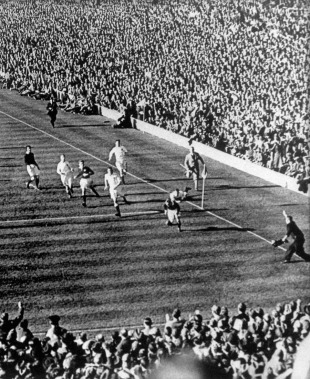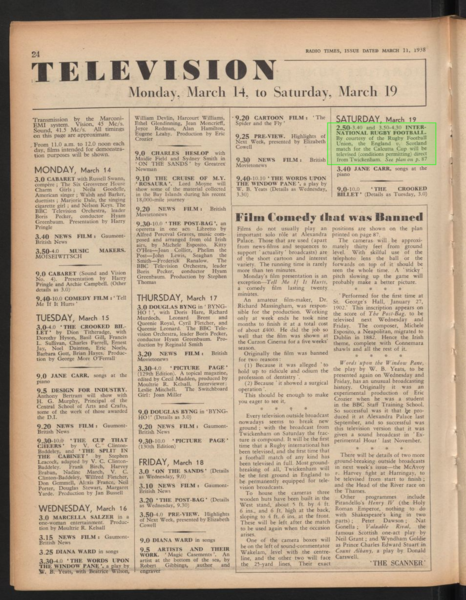England 16-21 Scotland (partially found footage of Home Nations Championship game; 1938)
On March 19th, 1938, the England and Scotland rugby union teams competed in a match to determine who would win that year's Calcutta Cup. This match was notable for a variety of reasons; these included Scotland's last win at Twickenham until 1965, as well as the team winning any title, Triple Crown or Grand Slam until achieving all three in 1985. It was also the first televised rugby match.
Background
Heading into the event, Scotland were joint-first in the 1938 Home Nations Championship, level on points with Wales but with a game in hand. They defeated Wales 8-6, before going on to beat Ireland 23-14. Meanwhile, England lost their opening match to Wales 8-14, but beat Ireland 36-14. Despite Scotland having an advantage prior to the match, much was at stake. If Scotland ended up victorious, they would claim not only the title for themselves but also the Triple Crown, an honour bestowed to Home Nations teams that managed to beat the other three, which is still possible in the modern Six Nations. Additionally, whoever won the match would also win the Calcutta Cup, which has signified the winner of this long rivalry since 1879. Therefore, Scotland had the opportunity to win three titles in one match.[1]
Meanwhile, the BBC was looking to broadcast various sports for its relatively new Television Service. Previously, it had covered rugby union via radio since 1927, when it aired the England-Wales game on 15th January.[2] The organisation decided that the England-Scotland game would be ideal as the first televised rugby match, because of Twickenham's geographical proximity to Alexandra Palace and having received permission by the Rugby Football Union.[3][4] Nevertheless, the broadcast was not without its challenges. Aside from issues concerning a misspelt graphic for the Scottish team and the bright sunlight on the day, the BBC had also decided to simplify the difficulty of showing televised rugby back then by having Teddy Wakelam, a former Harlequin player, commentate simultaneously for radio and television. Ultimately, a limited audience mainly within the London area was able to watch the match due to limited transmission and the high costs of buying a television back then, but there were reports that viewers in Guernsey, North Yorkshire and Malvern also picked up the match.[5]
Ultimately, this Calcutta Cup match proved to be one of the strongest on record, and justified the BBC to broadcast future rugby union matches and later other sporting occasions. Scotland would ultimately prevail 21-16, winning the 1938 Home Nations Championship, Calcutta Cup and Triple Crown.[6] The last ten minutes before half-time were especially eventful thanks to four tries, with Scotland earning three of them. Ultimately, Scotland would not win again at Twickenham until 1965, and would not win any more titles before achieving a clean sweep in 1984.
Availability
Like other early BBC television broadcasts, this rugby match was broadcast live and was not recorded. Therefore, televised footage of the match is now permanently missing. Nevertheless, highlights of the match itself are still available, thanks to publicly accessible British Pathé newsreels.
Gallery
Videos
Image
See Also
- 1924 NSWRFL Premiership Final (lost radio coverage of rugby league game; 1924)
- 1927 Challenge Cup Final (lost radio coverage of rugby league game; 1927)
- 1948 Challenge Cup Final (partially found footage of rugby league game; 1948)
- 1954 Rugby League World Cup Final (partially found footage of international rugby league game; 1954)
- Christchurch vs High School Old Boys (lost radio coverage of charity rugby game; 1926)
- England 11-9 Wales (lost radio coverage of Five Nations Championship game; 1927)
- Great Britain 20-19 New Zealand (partially found footage of international rugby league game; 1951)
- North Sydney Bears 19-21 Balmain Tigers (lost footage of NSWRFL Premiership season game; 1961)
- Scotland 21-13 England (lost radio coverage of Five Nations Championship game; 1927)
References
- ↑ ESPN article discussing the match and the build-up to it. Retrieved 22 May '21
- ↑ BBC detailing its first radio coverage of a rugby match. Retrieved 17th Sep '23
- ↑ BBC Genome archive of Radio Times issues, listing the match and the BBC receiving permission by the Rugby Football Union. Retrieved 22 May '21
- ↑ Issue 754 of Radio Times listing the match. Retrieved 22 May '21
- ↑ ESPN article discussing BBC televising the match, the challenges regarding it, and the match itself. Retrieved 22 May '21
- ↑ SW Londoner article discussing the occasion and the television history surrounding it. Retrieved 22 May '21

